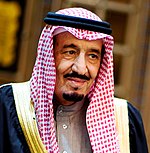.
Absolute monarchy or absolutism is a monarchical form of government in which the monarch has absolute power among his or her people. An absolute monarch wields unrestricted political power over the sovereign state and its people. Absolute monarchies are often hereditary but other means of transmission of power are attested. Absolute monarchy differs from constitutional monarchy, in which the monarch's authority is legally bound or restricted by a constitution.[1]
In theory, the absolute monarch exercises total power over the land, yet in practice the monarchy is counterbalanced by political groups from among the social classes and castes of the realm, such as the aristocracy, clergy, and middle and lower classes.
Some monarchies have weak or symbolic legislatures and other governmental bodies that the monarch can alter or dissolve at will. Countries where the monarch still maintains absolute power are Brunei,[2] Qatar,[3] Oman,[4] Saudi Arabia,[5] Swaziland,[6] the emirates comprising the UAE,[7] and Vatican City.[8]
Contemporary monarchies[edit]
The popularity of the notion of absolute monarchy declined substantially after the French Revolution which promoted theories of government based on popular sovereignty.
Many nations formerly with absolute monarchies, such as Jordan, Kuwait and Morocco, have moved towards constitutional monarchy, although in some cases the monarch retains tremendous power, to the point that the parliament's influence on political life is negligible.
In Bhutan, the government moved from absolute monarchy to constitutional monarchy following planned parliamentary elections to the Tshogdu in 2003, and the election of a National Assembly in 2008. Nepalhad several swings between constitutional rule and direct rule related to the Nepalese Civil War, the Maoist insurgency, and the 2001 Nepalese royal massacre, with the Nepalese monarchy being abolished on May 28, 2008. In Tonga, the king had majority control of the parliament until 2010.
On the other hand, Liechtenstein has moved towards expanding the power of the monarch: the Prince of Liechtenstein was given expanded powers after a referendum amending the Constitution of Liechtenstein in 2003, which led the BBC to describe the prince as an "absolute monarch again".[17]
The ruling Kim family in North Korea (Kim Il-sung, Kim Jong-il and Kim Jong-un) has been described as a de facto absolute monarchy[18][19][20] or "hereditary dictatorship".[21]
Current examples[edit]
Saudi Arabia[edit]
Saudi Arabia is an absolute monarchy,[5] although, according to the Basic Law of Saudi Arabia adopted by royal decree in 1992, the king must comply with Shari'a (Islamic law) and the Qur'an. The Qur'an and the corpus of Sunnah (traditions of the Prophet Muhammad) are declared to be the Kingdom's constitution, but no written modern constitution has ever been written for Saudi Arabia, which remains one of two Arab nations where no national elections have ever taken place since its founding,[24] the other being Qatar. No political parties or national elections are permitted[5] and according to The Economist's 2010 Democracy Index, the Saudi government is the seventh most authoritarian regime from among the 167 countries rated.[25]
Scholarship[edit]
Anthropology, sociology, and ethology as well as various other disciplines such as political science attempt to explain the rise of absolute monarchy ranging from extrapolation generally, to certain Marxist explanations in terms of the class struggle as the alleged underlying dynamic of human historical development generally and absolute monarchy in particular.
According to Norbert Elias's The Civilizing Process, monarchs such as Louis XIV could enjoy such great power because of the structure of the societies at that time: more precisely, they could play off against each other two rival classes, namely the rising bourgeoisie, who grew wealthy from commerce and industrial production, and the nobility, who lived off the land and administrative functions.
Other scholars such as Jean Domat have defended the concept of absolute monarchy in works such as on Social Order and Absolute Monarchy", citing absolute monarchy as preserving natural order as Godintended.[26]
'연구하는 인생 > Histrory' 카테고리의 다른 글
| Louis XIV (0) | 2015.11.10 |
|---|---|
| Charles V, Holy Roman Emperor (0) | 2015.11.09 |
| Medieval Dark Ages (0) | 2015.11.07 |
| ** Historical Maps - youtube (0) | 2015.11.06 |
| *** History divided by Periods (0) | 2015.11.05 |

